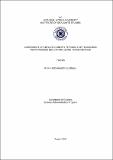DSpace@İHÜ
ASSESSMENT OF LIBYAN ECONOMY THROUGH KEY ECONOMIC PERFORMANCE INDICATORS USING TOPSIS METHOD
JavaScript is disabled for your browser. Some features of this site may not work without it.
| dc.contributor.author | ELDINALI, RIM H MOHAMED
|
|
| dc.date.accessioned | 2021-05-04T10:28:17Z | |
| dc.date.available | 2021-05-04T10:28:17Z | |
| dc.date.issued | 2020 | |
| dc.identifier.uri | http://hdl.handle.net/11547/8377 | |
| dc.description.abstract | The need for economic development and growth gave the research through economic performance indicators a great significance. Considering the limitations of the current equations and models, there is a need for a more complex machine-learning approach to assess economic performance over several years for comparison and precise outcomes. Multi-criteria decision-making techniques (MCDMs) are widely used to compare attributes and select alternative in complex decision-making problems. While the main source of data is often the input of experts from the field, adopting actual economic data can eliminate the uncertainty factor of the MCDM and provide more accurate results. The current study aims to assess the performance of the Libyan economy between the years of 2009 and 2017 using the TOPSIS method in order to understand the factors that contributed into enhancing the economy in the best years. The TOPSIS method is widely used in economic and management applications, as it is helpful in determining the alternative that is the closest to the ideal solution. Through studying the economic factors affecting the Libyan economy between 2009 and 2017, the findings of the research show that 2017 was the best year for economic performance. Prior the late political instability in the country, 2010 is indicated as the second-best year for economic performance with 20.18% enhanced performance from the year before. The worst years for economic performance in Libya were between 2012 and 2014 due to the civil war between the different political and militant powers in the country. However, from 2015 to 2017 a substantial enhancement in the economic performance is observed during a stability period. The current crisis in the country highlighted the impact of oil-dependency on the Libyan economy. Thus, it is understood that adopting oil as the main income of the country increase the vulnerability of the economy and has impacts on the other economic factors, including foreign currency exchange rates | tr_TR |
| dc.subject | economic performance indicators | tr_TR |
| dc.subject | Libya | tr_TR |
| dc.subject | TOPSIS | tr_TR |
| dc.title | ASSESSMENT OF LIBYAN ECONOMY THROUGH KEY ECONOMIC PERFORMANCE INDICATORS USING TOPSIS METHOD | tr_TR |
| dc.type | Thesis | tr_TR |
Bu öğenin dosyaları:
Bu öğe aşağıdaki koleksiyon(lar)da görünmektedir.
-
Tezler -- Thesis [3470]
